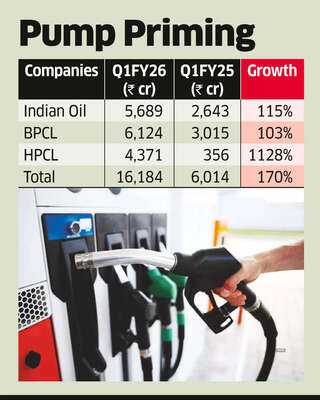Indian Oil Corporation, Hindustan Petroleum Corporation (HPCL) and Bharat Petroleum Corporation (BPCL) posted a combined profit of ₹16,184 crore in the quarter to June, an increase of more than two and a half times year-on-year, buoyed by extraordinary retail margins on petrol and diesel despite heavy inventory losses.
Petrol earned the state-run oil marketers an estimated ₹10.3 per litre at the pump, up from ₹ 4.4 a year earlier, while diesel fetched ₹8.2 per litre versus ₹2.5, according to brokerage ICICI Securities. These gains came from a domestic price freeze even as international fuel prices slid - crude down 21%, petrol 18% and diesel 16%, as per petroleum and natural gas ministry data.

The sharp fall in crude, however, inflicted large inventory losses, eroding refining margins. Indian Oil Corporation alone booked an inventory loss of ₹6,465 crore in the June quarter against a gain of ₹3,345 crore in the year-ago period. Its gross refining margin (GRM) fell to $2.15 a barrel from $6.39. Adjusted for inventory swings, GRM improved to $6.91, compared with $2.84 last year.
Analysts expect strong marketing margins to persist if crude prices remain soft and domestic pump rates stay unchanged. But refiners face headwinds as imports of discounted Russian oil become less certain and price discounts narrow, eroding the crude-cost advantage. Companies are also diversifying their crude basket to manage supply risks. Discounts on Russian crude have shrunk to $1.5-2 per barrel, according to industry executives.
Some Indian refiners are delaying orders for September-loading Russian oil cargoes as they await clarity on how US President Donald Trump's proposed 25% oil purchase-linked penalty will play out. The penalty takes effect on August 27, and some refiners are unwilling to take chances.
For refiners, additional earnings support in this quarter could come from the government's decision to release ₹30,000 crore to compensate oil companies for LPG under-recoveries.
Petrol earned the state-run oil marketers an estimated ₹10.3 per litre at the pump, up from ₹ 4.4 a year earlier, while diesel fetched ₹8.2 per litre versus ₹2.5, according to brokerage ICICI Securities. These gains came from a domestic price freeze even as international fuel prices slid - crude down 21%, petrol 18% and diesel 16%, as per petroleum and natural gas ministry data.
The sharp fall in crude, however, inflicted large inventory losses, eroding refining margins. Indian Oil Corporation alone booked an inventory loss of ₹6,465 crore in the June quarter against a gain of ₹3,345 crore in the year-ago period. Its gross refining margin (GRM) fell to $2.15 a barrel from $6.39. Adjusted for inventory swings, GRM improved to $6.91, compared with $2.84 last year.
Analysts expect strong marketing margins to persist if crude prices remain soft and domestic pump rates stay unchanged. But refiners face headwinds as imports of discounted Russian oil become less certain and price discounts narrow, eroding the crude-cost advantage. Companies are also diversifying their crude basket to manage supply risks. Discounts on Russian crude have shrunk to $1.5-2 per barrel, according to industry executives.
Some Indian refiners are delaying orders for September-loading Russian oil cargoes as they await clarity on how US President Donald Trump's proposed 25% oil purchase-linked penalty will play out. The penalty takes effect on August 27, and some refiners are unwilling to take chances.
For refiners, additional earnings support in this quarter could come from the government's decision to release ₹30,000 crore to compensate oil companies for LPG under-recoveries.
You may also like

Radioactive shrimps found? FDA warns against consuming certain frozen shrips; cites potential Cesium-137 contamination

INDIA bloc names former SC judge Sudershan Reddy as its VP candidate

Trump slams 'woke' museums for failing to celebrate America's 'success'

'He's interested in sports, but doesn't play games in politics': PM Modi on NDA vice-president nominee CP Radhakrishnan

Tech expert's holiday phone hack every parent should know before travelling






